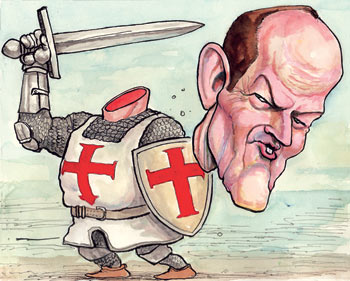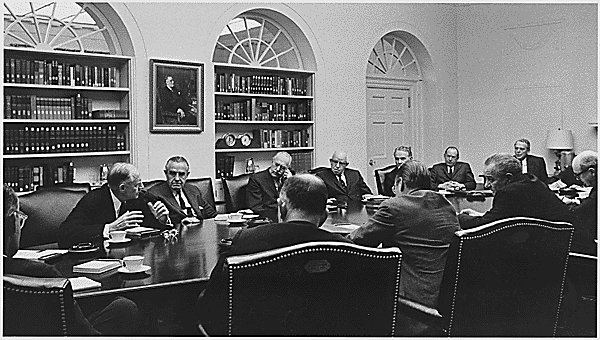Humility Update: Elliot Spitzer, the Iraq War, and Lessons for Leaders
Oh, how the mighty have fallen!
 One week ago Elliot Spitzer was governor of New York, working hard to overcome an admittedly rocky first year in office. Today he’s gone, felled by a prostitution scandal that has all the markings of Greek tragedy.
One week ago Elliot Spitzer was governor of New York, working hard to overcome an admittedly rocky first year in office. Today he’s gone, felled by a prostitution scandal that has all the markings of Greek tragedy.
From the moment the news broke last week, I’ve received dozens of e-mails from students, clients, friends, and blog readers asking whether/when I would post about the governor. I held back, for several reasons. First, what can one say in the moment that isn’t in very bad taste or already said? Second, I didn’t want to seem to be piling on. And third, I felt sympathy for the human beings affected by his behavior: certainly for his family; even for Mr. Spitzer; also for the then-unidentified woman, whose photo has now been splashed all over the papers, including the online versions of those sensationalist tabloids the New York Times and Wall Street Journal.
But from a modest distance, some lessons now begin to emerge. One of them is this: Absent a dollop of humility, there’s a substantial likelihood of humiliation.
Lack of Humility Leads to Humiliation
One of the themes of this blog – and a fundamental principle of crisis management – is that most harm in a crisis is self-inflicted. The other is that lack of humility – arrogance, entitlement, bullying, etc. – is a predictor of self-inflicted harm.
One of the wisest pieces of advice on this subject – which I’ve used with impunity for the last 10 years – comes from the Wall Street Journal Business World columnist Holman Jenkins. He noted in 1998:
“Organizations need defenses against their charismatic leaders. Otherwise such individuals can too readily bully or seduce others into supporting their vainglorious illusions.” (Holman Jenkins, Business World Column, The Wall Street Journal, August 19, 1998, page A19. No free link available.)
Needed: Defenses Against Charismatic Leaders
Governor Spitzer is hardly unique in being such a leader driven by vainglorious illusions and the arrogance to assume that he’s always right, and that being right is all that matters. This is a common failing in leaders of all stripes: in business, in religion, in politics – in short, in life.
This week also marks the fifth anniversary of the US invasion of Iraq.  As we enter the sixth year of the war, we hearken back to the words of then-Secretary of Defense Donald Rumsfeld, who before the invasion told a CBS radio audience: “I can’t tell you if the use of force in Iraq today would last five days, or five weeks, or five months, but it certainly isn’t going to last any longer than that.”
As we enter the sixth year of the war, we hearken back to the words of then-Secretary of Defense Donald Rumsfeld, who before the invasion told a CBS radio audience: “I can’t tell you if the use of force in Iraq today would last five days, or five weeks, or five months, but it certainly isn’t going to last any longer than that.”
 Or Vice President Richard Cheney, who exactly five years ago this weekend had this exchange with Tim Russert on NBC’s Meet the Press, in which he wouldn’t even consider the possibility that his assumptions might be mistaken:
Or Vice President Richard Cheney, who exactly five years ago this weekend had this exchange with Tim Russert on NBC’s Meet the Press, in which he wouldn’t even consider the possibility that his assumptions might be mistaken:
MR. RUSSERT: “If your analysis is not correct, and we’re not treated as liberators, but as conquerors, and the Iraqis begin to resist, particularly in Baghdad, do you think the American people are prepared for a long, costly, and bloody battle with significant American casualties?”
VICE PRES. CHENEY: “Well, I don’t think it’s likely to unfold that way, Tim, because I really do believe that we will be greeted as liberators. The read we get on the people of Iraq is there is no question but what they want to the get rid of Saddam Hussein and they will welcome as liberators the United States when we come to do that.”
Memento Mori
So what are the defenses that work to keep charismatic leaders from bullying and seducing others into supporting their vainglorious illusions?
 In the Roman Empire a triumphant general parading through the streets was followed by a slave whose job was to persistently remind the general that although he may be at the top of the world today, tomorrow is another day, and anything can happen. Memento mori: Remember, you are mortal!
In the Roman Empire a triumphant general parading through the streets was followed by a slave whose job was to persistently remind the general that although he may be at the top of the world today, tomorrow is another day, and anything can happen. Memento mori: Remember, you are mortal!
In medieval times this role was assumed by a jester, the only person who could speak freely in the presence of the monarch without risk of immediate and severe punishment. The pretext of “in jest” was seen to immunize the speaker because a joke was understood to be different from a challenge to authority.
President Lyndon B. Johnson surrounded himself with the “Wise Men,” a group of luminaries who initially were yes-men but who in March, 1968 had a tough-love discussion that forced the president to recognize that the war in Vietnam was unwinable.
Today organizations are ever-more in need of such defenses. Stakeholder expectations are higher than ever. The velocity of communication – and of criticism – is faster than ever. And, as Governor Spitzer learned, there are no more secrets.
How can a leader build in such protection? To start, the leader can find someone he or she trusts completely, and make a point of regularly seeking honest and candid input. Or formalize a relationship with a mentor – but the mentor needs to be someone with a sufficiently different perspective that he or she won’t be in lockstep with the leader. Or the leader can hire someone to be a thought partner – a role our firm often assumes. In these relationships, the leader needs to persistently ask: “This is what I’m considering; what am I missing?”
The trusted advisor, in turn, needs to use a combination of empathy and tough love, and persistently admonish the leader in much the same way that Oliver Cromwell admonished the General Assembly of the Church of Scotland in 1650: “I beseech you, in the bowels of Christ, think it possible that you may be mistaken.”
Of course, even seeking the input of a trusted advisor requires a dollop of humility in the first place: a recognition that maybe – just maybe – the leader might be wrong; that there may be other valid perspectives. To paraphrase a very old and not-very-good joke,
How many trusted advisors does it take to change a light bulb?
Only one, but the bulb has to really want to change.
Absent a willingness to change, absent a dollop of humility, the risk for the leader is humiliation. And in the case of Messrs. Rumsfeld and Cheney, there’s the added risk of further serious unintended consequence with meaningful national policy implications.



Leave a Reply
Want to join the discussion?Feel free to contribute!